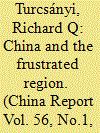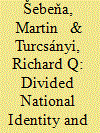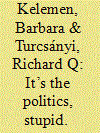|
|
|
Sort Order |
|
|
|
Items / Page
|
|
|
|
|
|
|
| Srl | Item |
| 1 |
ID:
170658


|
|
|
|
|
| Summary/Abstract |
Central and Eastern Europe (CEE) had few historical opportunities to interact with China, but with the Belt and Road Initiative (BRI) and the 16+1 platform, that changed dramatically in recent years. The article discusses recent development in the China-CEE relations with the aim of explaining why the CEE countries became excited about China initially, but also why this excitement led prevailingly to disappointment. It will be argued that the frustration with the EU in the aftermath of the 2008 crisis created an environment in which China was, for a moment, perceived as a promising alternative. A few years into the new diplomatic initiatives, however, most of the CEE countries started to be unsatisfied with the lack of economic results. Eventually, the article will assess the implications of the new era of China-CEE relations for the EU affairs and broader Chinese relations with the developing world. The CEE region is in a specific position vis-à-vis China, for it is structurally in between the developed and the developing world. Moreover, the EU membership adds some critical features which make the Chinese offer less applicable and appealing.
|
|
|
|
|
|
|
|
|
|
|
|
|
|
|
|
| 2 |
ID:
180447


|
|
|
|
|
| Summary/Abstract |
The COVID-19 pandemic has been discussed as strengthening nationalist as opposed to globalist forces around the world. While this may be the case in some countries, in others we can observe an increasing political polarization between the “globalists” and “nationalists” rather than a unification against an “outside enemy.” The article presents a case study of the Czech Republic, which has long had a turbulent relationship with China. We show how the coronavirus pandemic has escalated the polarization of Czech politics, in which China has become a symbol of the major political fault line. We argue, first, that the vastly different attitudes of Czech officials vis-à-vis China are not the result of their changing opinions in time. Instead, the electoral reshufflings elevate politicians with significantly different views of China. Second, we argue that although the political division may today appear to be symbolized by its approach toward the Communist legacy, the division actually goes to the 19th-century debate about the Czech national identity. Eventually, we end up with a discussion on how the image of China in a faraway country is being formed to a large extent following the domestic political dynamics rather than being driven by the significantly more powerful China.
|
|
|
|
|
|
|
|
|
|
|
|
|
|
|
|
| 3 |
ID:
174804


|
|
|
|
|
| Summary/Abstract |
The goal of this paper is to present an explanation of why the Muslim governments largely abstained from even bringing up the Uyghur case with China, while the Rohingya issue provoked official condemnations by the governments in many Muslim countries. Although economic factors are most often consulted internationally, this article puts forward political factors as sufficient to explain the Muslim governments’ responses to the Xinjiang issue – primarily the domestic politics, and secondarily seeking of strategic alternatives to balance the West. In the context of hybrid political regimes in many Muslim countries, the domestic public opinion played an important role in deciding whether the government would address the issue. Effectively only Turkey presents the case where the public pays attention to the Uyghurs, and the government felt obliged to raise the issue at least to some extent.
|
|
|
|
|
|
|
|
|
|
|
|
|
|
|
|
|
|
|
|
|